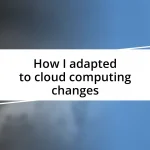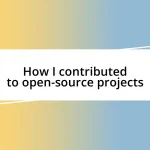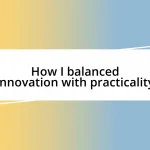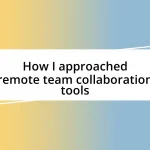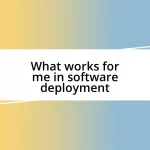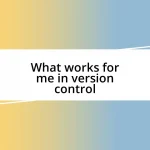Key takeaways:
- The author’s curiosity about VPNs was sparked by a friend’s mention and the realization of online privacy issues, leading to personal exploration of VPN technology.
- Common misconceptions about VPNs include the belief in complete anonymity, consistent speed reduction, and the assumption that all VPNs are equal, highlighting the need for informed choices.
- Practical tips for using VPNs include connecting to nearby servers for better speed, testing different servers, and understanding the privacy policies of the chosen provider to enhance digital security.

My initial curiosity about VPNs
It all started when I heard a friend casually mention using a VPN while traveling abroad. I remember thinking, why would someone need a VPN? At that time, I didn’t grasp the depth of online privacy and security issues that might come into play.
My curiosity piqued further when I stumbled upon an article about people accessing restricted content in their home country. I thought, how wild is it that a simple software can open up a world of information? It sparked a desire in me to not only understand how it works but also to explore what it could mean for my own digital freedom.
A few weeks later, I decided to dive deeper by trying out a VPN for myself. Sitting down with my laptop, I felt an exhilarating mix of excitement and nervousness. What would I discover? Would my browsing experience change dramatically? This firsthand experience fueled my desire to uncover the layers of what VPNs truly offered beyond just anonymity.

Common misconceptions about VPNs
When I first began exploring VPNs, I quickly realized that many people hold some pretty off-base ideas about them. One common misconception is that VPNs are a one-way street to complete anonymity. Yes, they enhance privacy, but they don’t make you invisible online. I vividly remember when a friend of mine assumed that using a VPN meant he could share his password with anyone without repercussions. It was quite the wake-up call when I explained that online behavior is still traceable in many ways, even with a VPN.
Another thing I often hear is the belief that VPNs always slow down your internet connection. While it’s true that your speed can be affected, it’s not always the case. In my experience, I’ve actually noticed faster connection speeds when using a VPN, especially when accessing content restricted in my region. Sometimes, I remind people that the difference lies in the distance between the servers and the quality of the VPN service used.
Lastly, some assume that all VPNs are created equal. This couldn’t be further from the truth! I’ve tested various providers, and the differences are significant. Factors such as encryption methods, server locations, and a commitment to no-logs policies can all impact your experience. I remember being taken aback by how much difference a reputable provider made in my online activities.
| Misconception | Fact |
|---|---|
| VPNs provide complete anonymity | They enhance privacy but don’t make you invisible. |
| VPNs always slow down internet connection | They can actually improve speeds depending on the service. |
| All VPNs are the same | Quality and features vary significantly among providers. |

Choosing the right VPN service
When it comes to choosing the right VPN service, I can’t stress enough how important it is to evaluate what you truly need from a VPN. The first time I navigated this decision, I felt overwhelmed by the choices. I remember poring over reviews and features, realizing that my priorities—like streaming capabilities and security features—played a crucial role. It’s not just about finding something that works; it’s about finding something that aligns with your specific needs.
Here are some key factors I always consider when selecting a VPN service:
- Security Protocols: Look for strong encryption protocols like OpenVPN or WireGuard.
- No-Logs Policy: Ensure they don’t keep logs of your activity to protect your privacy.
- Speed: Check reviews for speed benchmarks—this matters if you plan on streaming or gaming.
- Server Locations: A diverse network of servers helps you access more content globally.
- Device Compatibility: Make sure it supports the devices you intend to use it on.
- Customer Support: Reliable customer service can be a lifesaver if you run into issues.
I still recall the moment I found my first reputable VPN. The relief and assurance it provided me, knowing my browsing was secured, felt like wrapping myself in a protective blanket. It’s that sense of security that keeps me informed about my options today; it truly elevates the online experience when you know you’re protected.

Practical tips for using VPNs
One of the first practical tips I share with friends starting to use VPNs is to always connect to a server that is geographically closer to your actual location. I remember when I mistakenly logged into a server halfway across the world—I experienced significant lag, which was frustrating while trying to stream my favorite show. By sticking to servers that are closer, not only do you achieve faster speeds, but you also reduce the possibility of connection drops.
Another valuable tip is to test different servers within the VPN application to find the best one for your needs. I recall the trial-and-error phase I went through, hopping between various servers before I hit the sweet spot that allowed me to watch videos without buffering. It’s like finding the right seat in a crowded theater to maximize your view; investing a little time in server selection can make a huge difference in your experience.
Lastly, I often remind users to educate themselves about the privacy policies of their chosen VPN provider. Many might not think much of this, but understanding how your data is handled is crucial. I remember being pleasantly surprised by how transparent my current VPN was about its data practices. Knowing they truly respect user privacy makes me feel more at ease. Have you looked into your VPN’s policy lately? You might discover something that reassures—or concerns—you.

My reflections on the journey
Reflecting on my journey with VPNs, I feel as though it has been equal parts enlightening and empowering. I still remember the first time I used a VPN to access content that was blocked in my region. The thrill of suddenly having the world at my fingertips was exhilarating, almost like finding a secret door to a treasure trove of information and entertainment. That moment sparked my passion for digital freedom and guided me on my quest for finding the best tools to protect my online presence.
As I delved deeper, I found myself confronting the complexities of online privacy, which often felt daunting. The numerous articles and forums can be overwhelming, but I recall sitting on my couch with a cup of coffee, determined to grasp the concept of encryption. I had to remind myself that this journey was about becoming more informed, not just about following trends. After all, how can we advocate for our privacy if we don’t fully understand the tools we use? That realization became a turning point, propelling me to seek out not just functionality in a VPN, but also the knowledge to appreciate its importance.
Throughout this journey, I’ve developed a sense of responsibility—not just for my own online safety, but also to share what I’ve learned with others. It’s remarkable how sharing knowledge can spark curiosity in those around us. Have you ever shared a useful tip and felt that rush of excitement when you see someone benefit from it? Moments like these strengthen my belief that understanding VPNs is not just a personal journey; it’s a collective reinforcement of our right to privacy in a digital world.
